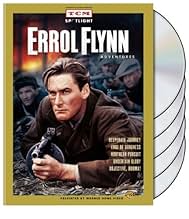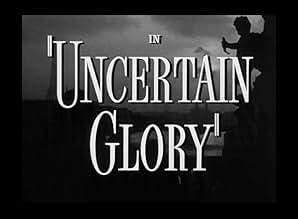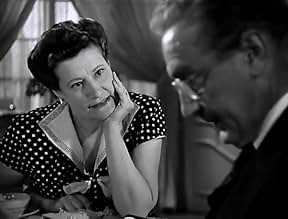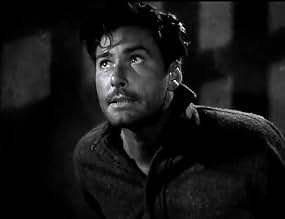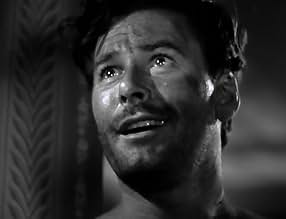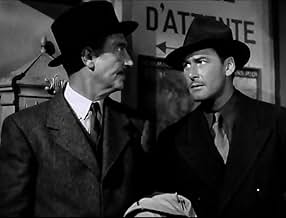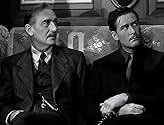ÉVALUATION IMDb
7,1/10
1,6 k
MA NOTE
Ajouter une intrigue dans votre langueAfter a career criminal is recaptured and knows he faces the guillotine, he offers to exchange his life for 100 hostages slated for execution by the Germans.After a career criminal is recaptured and knows he faces the guillotine, he offers to exchange his life for 100 hostages slated for execution by the Germans.After a career criminal is recaptured and knows he faces the guillotine, he offers to exchange his life for 100 hostages slated for execution by the Germans.
Douglass Dumbrille
- Police Commissioner LaFarge
- (as Douglas Dumbrille)
Felix Basch
- Gestapo Major
- (uncredited)
Frederic Brunn
- German Soldier Reporting to Major
- (uncredited)
Nora Bush
- Townswoman
- (uncredited)
James Carlisle
- Townsman
- (uncredited)
Wallis Clark
- Razeau
- (uncredited)
Pedro de Cordoba
- Executioner
- (uncredited)
Fred Cordova
- Execution Guard
- (uncredited)
Avis en vedette
Errol Flynn always wanted to prove that he was a dramatic actor of range, not an athletic non-entity who was always demonstrating his abilities as a horseman, a fighter, or a swordsman. That his best adventure films did show him as more than just an acrobat he barely understood. He wanted to play normal types. But normal types look more like Walter Matthau or Paul Muni or Allan Jenkins - they are not the strikingly handsome Flynn.
In 1944 Flynn did this film which was a war picture but not like DIVE BOMBER or OBJECTIVE: BURMA. The film was about a French criminal who had committed a murder and was tried and convicted for that homicide. He is able to escape the guillotine when a bomb hits the prison just as the execution is about to occur. He flees, and manages to get into the countryside. Pursuing him is Paul Lucas, the French police inspector who arrested him originally. Lucas finds Flynn, but at that time an act of sabotage against the Nazis occurs. When the Nazis threaten to kill 100 French hostages unless the saboteurs appear, Flynn offers Lucas a "devil's" choice: If Lucas will not act for the next few days, Flynn will surrender himself to the Nazis as the saboteur (he prefers being shot by a firing squad rather than being guillotined). Lucas has little real choice - unless he is willing to do the same thing instead of Flynn. But will Flynn keep his word or not? As Flynn meets a young girl and finds that they can flee away together, the audience wonders if he'll do the heroic thing or not.
Flynn is pretty good in this cynical part. It is obvious, once he makes the offer to Lucas, that he really planned not to go through with it. It is also true that as the moment of truth arises he gradually sees the hideous tragedy that his self-interest is likely to cause many families. The glimpse at occupied French society is also good, showing the victims and the collaborators. It is almost as good as the picture of that society in THIS LAND IS MINE.
Yet the film, produced by a company that Flynn was involved in, and selected by him, failed at the box office. The public did not quite accept a thinking man's Errol Flynn instead of the adventurous sexy star of THE SEA HAWK or GENTLEMAN JIM. It set back further attempts by Flynn to find straight dramatic parts. It also verified that Jack Warner, Flynn's studio boss, was a really smart man in knowing what the public liked or did not like for their stars.
In 1944 Flynn did this film which was a war picture but not like DIVE BOMBER or OBJECTIVE: BURMA. The film was about a French criminal who had committed a murder and was tried and convicted for that homicide. He is able to escape the guillotine when a bomb hits the prison just as the execution is about to occur. He flees, and manages to get into the countryside. Pursuing him is Paul Lucas, the French police inspector who arrested him originally. Lucas finds Flynn, but at that time an act of sabotage against the Nazis occurs. When the Nazis threaten to kill 100 French hostages unless the saboteurs appear, Flynn offers Lucas a "devil's" choice: If Lucas will not act for the next few days, Flynn will surrender himself to the Nazis as the saboteur (he prefers being shot by a firing squad rather than being guillotined). Lucas has little real choice - unless he is willing to do the same thing instead of Flynn. But will Flynn keep his word or not? As Flynn meets a young girl and finds that they can flee away together, the audience wonders if he'll do the heroic thing or not.
Flynn is pretty good in this cynical part. It is obvious, once he makes the offer to Lucas, that he really planned not to go through with it. It is also true that as the moment of truth arises he gradually sees the hideous tragedy that his self-interest is likely to cause many families. The glimpse at occupied French society is also good, showing the victims and the collaborators. It is almost as good as the picture of that society in THIS LAND IS MINE.
Yet the film, produced by a company that Flynn was involved in, and selected by him, failed at the box office. The public did not quite accept a thinking man's Errol Flynn instead of the adventurous sexy star of THE SEA HAWK or GENTLEMAN JIM. It set back further attempts by Flynn to find straight dramatic parts. It also verified that Jack Warner, Flynn's studio boss, was a really smart man in knowing what the public liked or did not like for their stars.
It was not until Marcel Ophul's 'Le Chagrin et la Pitié' that the myth of unified French resistance during the Nazi occupation was well and truly shattered. In this film from twenty-six years earlier France is likened to a nag who is 'too old to beef and too tough to die.'
This is a formulaic Warner Bros treatment but what a formula! Fluid editing and atmospheric cinematography from Warner stalwarts George Amy and Sidney Hickox with a dramatic score by Adolph Deutsch.
Warners had taken a chance on the unknown Errol Flynn as Captain Blood in 1935 and in Jack Warner's words: "we knew that we had grasped the brass ring in our thousand to-one shot spin." This is the fifth of seven films starring Flynn and directed by Raoul Walsh and as Flynn is the uncredited executive producer for his own short-lived Thomson Company one assumes he had a say in the casting.
Paul Lukas seems the obvious choice following his stunning performance in 'Watch on the Rhine' and it is the dynamic between his Inspector Bonet and Flynn's criminal Picard/Lafont that makes the film work. There is the customary mish mash of accents of course and Hollywood's inevitable 'God' element is here represented by the charismatic priest of Dennis Hoey. The formidable Lucille Watson never disappoints and there is a lovely performance by the enchanting newcomer Jean Sullivan who soon gave it up to concentrate on her first love, dance.
Throughout its forty-year existence Warners had some trash but it was seldom boring or pretentious and this entertaining film, although certainly not a 'classic', is no exception.
This is a formulaic Warner Bros treatment but what a formula! Fluid editing and atmospheric cinematography from Warner stalwarts George Amy and Sidney Hickox with a dramatic score by Adolph Deutsch.
Warners had taken a chance on the unknown Errol Flynn as Captain Blood in 1935 and in Jack Warner's words: "we knew that we had grasped the brass ring in our thousand to-one shot spin." This is the fifth of seven films starring Flynn and directed by Raoul Walsh and as Flynn is the uncredited executive producer for his own short-lived Thomson Company one assumes he had a say in the casting.
Paul Lukas seems the obvious choice following his stunning performance in 'Watch on the Rhine' and it is the dynamic between his Inspector Bonet and Flynn's criminal Picard/Lafont that makes the film work. There is the customary mish mash of accents of course and Hollywood's inevitable 'God' element is here represented by the charismatic priest of Dennis Hoey. The formidable Lucille Watson never disappoints and there is a lovely performance by the enchanting newcomer Jean Sullivan who soon gave it up to concentrate on her first love, dance.
Throughout its forty-year existence Warners had some trash but it was seldom boring or pretentious and this entertaining film, although certainly not a 'classic', is no exception.
Uncertain Gory is a thoughtful, well-made war/intrigue thriller staring Errol Flynn and Paul Lukas. Flynn, whose acting skill was oft unfairly derided as suitable only for swashbuckling, athletic roles, could have easily let himself be overshadowed by Lukas, a high-class dominant character actor known for his acerbic, psychological portrayals. In fact Flynn seems to have been inspired by his co-star and turns in what may have been the best acting job of his career.
While Flynn usually played the dashing hero, and Lukas was often cast in sinister roles, here the roles are reversed. Lukas portrays an upright police inspector escorting scummy lifelong criminal and convicted murderer Flynn through Nazi-occupied France to face the guillotine. As the Germans are preparing to execute a hundred French hostages unless the saboteur who blew up a bridge with a German troop train on it surrenders himself, Flynn suggests he could end his misspent life with a noble gesture by claiming to be the saboteur. He would rather be executed by firing squad anyway, he avers, than face the awful prospect of beheading. Against his better judgment, the inspector agrees. The complications and suspense hereafter hinge on whether consummate conman Flynn is sincere, or is he working the con of his life -- for his life. The ensuing cat-and-mouse game between the wily criminal and the determined, suspicious policeman provides an entertaining, suspenseful story and a pair of brilliantly realized character studies by Flynn and Lukas. Along the way, the criminal picks up the help of a naive, provincial shop girl, Jean Sullivan, a pretty, lithesome flamenco dancer, brilliantly cast in her introductory movie roll. Part of the suspense turns on whether Flynn actually loves the girl or is just using her.
Director Raoul Walsh has cinematographer Sid Hickox use many closeups to catch every nuance of facial expression in constructing deeply psychological and spiritual character studies. As in all Warner Brothers pictures of this era, the marvelous supporting cast sports many familiar and expressive faces. Lucille Watson plays her usual nasty matron as the bitter, manipulative mother of one of the hostages. Faye Emerson sizzles as one of Flynn' hard-bitten molls in the early going. James Flavin, almost unrecognizable in a black mustache and an Adrian helmet, turns in his typical stolid, authoritarian presence in a typically thankless roll as a harried militia captain feverishly searching for the saboteur. But Dennis Hoy is absolutely riveting as the parish priest. He is like Moses come down from the mountain as he roundly denounces as sinful and demoniacally inspired the plans of Watson and confederates to free their loved ones by fingering and innocent man as the saboteur. He is more quietly moving as he asks his congregation to kneel and beg God's forgiveness for their sins and the sins of their country which have caused them to be delivered into the hands of the enemy they hate.
Herein is the aspect of this picture different from what one sees throughout most of the classic movie era or any other time. Characters routinely pray and invoke the help of God, and there is much philosophical talk of God. Though ridiculing and joking at the time, Flynn's decadent thief is seen to be visibly moved as he watches tough cop Lukas kneel to pray in the church they have entered to avoid the Nazis and their Vichy militia toadies. We never know what Lukas is praying for -- his family in Paris? the success of their perilous scheme? forgiveness of his sins? -- but we are moved. At least those of us who are Christians are. Likewise as the escaped Flynn watches old people praying in a farm yard for the deliverance of the hostages and his innocent girlfriend lighting a candle for the same blessing. Such scenes were seldom seen in the l930's or the later 1940's. Hollywood was happy to forget God most of the time. Most of the rest of us are, too, until we start having troubles. World War II was a time of deep, deep, dark, dark troubles for the whole world. So Hollywood, like everyone else, except perhaps the most die-hard of commies, was remembering God. As soon as the war was over, and brighter times returned, God was promptly forgotten again.
Those hoping for a rat-a-tat-tat war action movie will be disappointed by Uncertain Glory. There is little action, though much suspense. This is more of a thinking person's Errol Flynn picture. It may be too philosophical and too Christian for some, but it should be rewarding in any case for the intense, psychological character studies by Flynn, Lukas, and the sterling supporting cast. A fine moral-boosting World War II piece, and top grade Old Hollywood entertainment from "the best of times and the worst of times."
While Flynn usually played the dashing hero, and Lukas was often cast in sinister roles, here the roles are reversed. Lukas portrays an upright police inspector escorting scummy lifelong criminal and convicted murderer Flynn through Nazi-occupied France to face the guillotine. As the Germans are preparing to execute a hundred French hostages unless the saboteur who blew up a bridge with a German troop train on it surrenders himself, Flynn suggests he could end his misspent life with a noble gesture by claiming to be the saboteur. He would rather be executed by firing squad anyway, he avers, than face the awful prospect of beheading. Against his better judgment, the inspector agrees. The complications and suspense hereafter hinge on whether consummate conman Flynn is sincere, or is he working the con of his life -- for his life. The ensuing cat-and-mouse game between the wily criminal and the determined, suspicious policeman provides an entertaining, suspenseful story and a pair of brilliantly realized character studies by Flynn and Lukas. Along the way, the criminal picks up the help of a naive, provincial shop girl, Jean Sullivan, a pretty, lithesome flamenco dancer, brilliantly cast in her introductory movie roll. Part of the suspense turns on whether Flynn actually loves the girl or is just using her.
Director Raoul Walsh has cinematographer Sid Hickox use many closeups to catch every nuance of facial expression in constructing deeply psychological and spiritual character studies. As in all Warner Brothers pictures of this era, the marvelous supporting cast sports many familiar and expressive faces. Lucille Watson plays her usual nasty matron as the bitter, manipulative mother of one of the hostages. Faye Emerson sizzles as one of Flynn' hard-bitten molls in the early going. James Flavin, almost unrecognizable in a black mustache and an Adrian helmet, turns in his typical stolid, authoritarian presence in a typically thankless roll as a harried militia captain feverishly searching for the saboteur. But Dennis Hoy is absolutely riveting as the parish priest. He is like Moses come down from the mountain as he roundly denounces as sinful and demoniacally inspired the plans of Watson and confederates to free their loved ones by fingering and innocent man as the saboteur. He is more quietly moving as he asks his congregation to kneel and beg God's forgiveness for their sins and the sins of their country which have caused them to be delivered into the hands of the enemy they hate.
Herein is the aspect of this picture different from what one sees throughout most of the classic movie era or any other time. Characters routinely pray and invoke the help of God, and there is much philosophical talk of God. Though ridiculing and joking at the time, Flynn's decadent thief is seen to be visibly moved as he watches tough cop Lukas kneel to pray in the church they have entered to avoid the Nazis and their Vichy militia toadies. We never know what Lukas is praying for -- his family in Paris? the success of their perilous scheme? forgiveness of his sins? -- but we are moved. At least those of us who are Christians are. Likewise as the escaped Flynn watches old people praying in a farm yard for the deliverance of the hostages and his innocent girlfriend lighting a candle for the same blessing. Such scenes were seldom seen in the l930's or the later 1940's. Hollywood was happy to forget God most of the time. Most of the rest of us are, too, until we start having troubles. World War II was a time of deep, deep, dark, dark troubles for the whole world. So Hollywood, like everyone else, except perhaps the most die-hard of commies, was remembering God. As soon as the war was over, and brighter times returned, God was promptly forgotten again.
Those hoping for a rat-a-tat-tat war action movie will be disappointed by Uncertain Glory. There is little action, though much suspense. This is more of a thinking person's Errol Flynn picture. It may be too philosophical and too Christian for some, but it should be rewarding in any case for the intense, psychological character studies by Flynn, Lukas, and the sterling supporting cast. A fine moral-boosting World War II piece, and top grade Old Hollywood entertainment from "the best of times and the worst of times."
I am like the poster who managed to go 40 years without seeing this movie. I can say that I liked it very much.
Yes it was a war time movie with all the baggage that entails, but the acting and story were good especially for this genre. It had tension and that tension never really let up for long. The turns and twists of the story were well grounded and the actions made sense within the context of some theatrical license. As with most movie buffs, your mind is ahead of the movie. But in this one I was never really sure which way the story would turn until the end. To me, that is a job well done.
I suppose if it were made today, Flynn would have been just as likely to not have done the noble thing. In the interests of a just society, I am glad he did. I too thought it was one of his best performances.
Yes it was a war time movie with all the baggage that entails, but the acting and story were good especially for this genre. It had tension and that tension never really let up for long. The turns and twists of the story were well grounded and the actions made sense within the context of some theatrical license. As with most movie buffs, your mind is ahead of the movie. But in this one I was never really sure which way the story would turn until the end. To me, that is a job well done.
I suppose if it were made today, Flynn would have been just as likely to not have done the noble thing. In the interests of a just society, I am glad he did. I too thought it was one of his best performances.
Right after Flynn's rape trial Warner put him in "quickie" inexpensive films not knowing how the public would respond to Flynn films. Uncertain Glory was one of them. Most reviewers of the time panned the film as a minor Flynn vehicle and heroic Flynn nonsense. However, as time has passed some modern day reviewers have re-evaluted this film and some have commented that Flynn gives a really good performance in a pretty darn good cat and mouse drama. And I totally agree. The story is interesting and the interplay between Flynn and Oscar-winning(The Watch on the Rhine) Paul Lukas is terrific. I think this is maybe Flynn's most underrated film. Whenever I watch it I imagine by Flynn's character the ending could have gone quite different and been more unpredictable but knowing the times(1944) and still in the midst of WWII the ending had to be what it was... Patriotic. Again, I think "Uncertain Glory" is a very underrated Flynn movie. *** of **** rating...easy.
Le saviez-vous
- AnecdotesErrol Flynn was criticized for playing heroes in World War II movies. Tony Thomas in his book 'Errol Flynn: The Spy Who Never Was' states that Flynn had tried to enlist in every branch of any armed services he could but was rejected as unfit for service on the grounds of his health. He had a heart condition, tuberculosis, malaria and a back problem. Flynn felt he could contribute to America's war effort by appearing in such films as Edge of Darkness (1943); Northern Pursuit (1943); Dive Bomber (1941), Aventures en Birmanie (1945) and Uncertain Glory (1944). Reportedly, Flynn was at his most professional and co-operative he ever was whilst working on Second World War movies. The studios apparently did not diffuse the criticism of Flynn's state-of-health as they wished to keep it quiet for fear of his box-office draw waning.
- GaffesAbout 1:20 into the film, there is a scene where the French police are coming into the town at night. One, on a motorcycle, rounding a corner, seemingly slips on the wet cobblestones and crashes in front of the camera - the shadow of his head flashes across the bottom of the screen and the sound of his presumed crash can be heard.
- Citations
Jean Picard: [indignantly to the barber just before he is to be sent to face the guillotine] My head comes off as it is!
- ConnexionsFeatured in The Adventures of Errol Flynn (2005)
- Bandes originalesLa Marseillaise
(1792) (uncredited)
Music by Claude Joseph Rouget de Lisle
Variations in the score often
Meilleurs choix
Connectez-vous pour évaluer et surveiller les recommandations personnalisées
- How long is Uncertain Glory?Propulsé par Alexa
Détails
- Durée1 heure 42 minutes
- Couleur
- Rapport de forme
- 1.37 : 1
Contribuer à cette page
Suggérer une modification ou ajouter du contenu manquant



